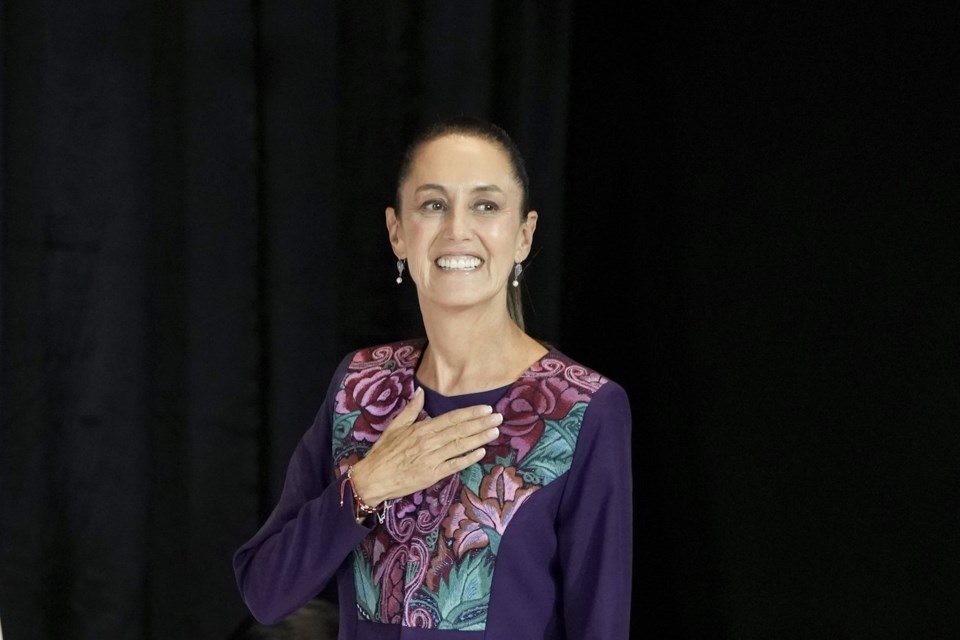OTTAWA — Mexico's election of its first female president could mean a stronger relationship with Canada, as analysts watch how Claudia Sheinbaum will approach civil rights and the possible return of former U.S. president Donald Trump.
"I think we'll see a friendly relationship," said Carleton University professor Laura Macdonald, who specializes in Mexican politics.
"And if Trump is re-elected, I think Mexico and Canada will really need each other more than ever, in order to confront the bully in the North American relationship."
Sheinbaum will replace Andrés Manuel Lopéz Obrador in October. Both hail from the left-wing Morena party, which has focused on improving conditions for the poor while facing criticism over organized crime in the country.
A former climate scientist, Sheinbaum is the first Jewish leader of Mexico, and first came to prominence as mayor of Mexico City.
Trudeau spoke with Sheinbaum by phone Monday, and Ottawa's readout says "they committed to working closely to strengthen North American competitiveness" and bilateral ties.
Sheinbaum wrote on the platform X in Spanish that both agreed on "the multiple common interests between Mexico and Canada and the great opportunities to strengthen our relationship."
The election comes three months after the Liberals reimposed a visa requirement for Mexican visitors over concerns that the 2016 lifting of the requirement led to a rise in ineligible refugee claims and human smuggling into the U.S.
In her victory speech, Sheinbaum promised to continue many of Lopéz Obrador's policies, but to "respect business freedom and honestly promote and facilitate national and foreign private investment" into Mexico.
"She's probably less likely to engage in inflammatory rhetoric," Macdonald said.
Duncan Wood, a vice-president at the Wilson Centre think tank in Washington and its senior Mexico adviser, said Sheinbaum's pledge for stable trade will be of particular interest to Canada, which is a leading source of investment in Mexican industries such as mining.
López Obrador restructured mining operations to keep more profits within Mexico, and also put restrictions on the energy sector.
Wood said Sheinbaum might repeal some investment restrictions while boosting environmental regulations, which he said would be an opportunity for Canadian industry, particularly when it comes to natural gas and renewables.
He said he expects Sheinbaum will avoid policies that leave Mexico accused of breaching trade agreements.
"The relationship with Canada has been difficult over the last six years for a number of reasons, in part because of the bluster of Lopéz Obrador. But also, because there are real issues in the bilateral relationship to do with investment disputes."
Along with the U.S., the two countries will be part of the 2026 review of the trade deal that replaced NAFTA.
Ahead of the election later this year, American President Joe Biden and his likely election opponent Donald Trump have both been proposing policies that would clamp down on trade.
On Monday, Trudeau called the existing agreement "the envy of the world, and the result of a strong, mutually beneficial relationship."
Wood noted the North American deal is a way for Mexico to sell itself as a stable country for foreign investment.
He also said Mexico will find common cause with Canada over concerns with the current situation for the automobile sector, one of multiple industries for which Sheinbaum might demand better policies from the U.S.
"She has a long-standing attitude that the United States has been pushing Mexico around for far too long," he said.
In addition to trade, Trudeau said in a statement that he wants to work with Sheinbaum on climate change, international security, gender equality and reconciliation with Indigenous Peoples.
Canada is still aiming to host the next North American Leaders' Summit this year, despite the U.S. presidential election in November and Mexico revealing earlier this year that Ottawa had arranged for the summit to take place in February before plans fell through.
Trudeau's office said both leaders "expressed their desire to meet in person soon" during their Monday call.
Wood was in Mexico as an election observer and said the "huge victory" for Sheinbaum's party surprised people, who expected her to win but not to have a possible supermajority in the Mexican congress.
The result could give her party wide berth to change Mexico's constitution, following López Obrador taking steps to take powers away from independent regulators and decrying American funding for civil-society groups that are critical of the government.
Freedom House says Mexico's defence department has used spyware to infiltrate the mobile phones of numerous activists, while Human Rights Watch says the government's proposed legal reform threatens judicial independence.
"Behind the scenes, there are some concerns about what he might have been doing to restrict democratic institutions," Macdonald said of Lopéz Obrador. "That will be a theme under the new president"
Still, Macdonald said Canada and Mexico are each other's best hopes if the U.S. decides "it won't be easy sailing" in continental trade.
"We have common interests, and we just have to keep working on developing the relationship."
This report by The Canadian Press was first published June 3, 2024.
Dylan Robertson, The Canadian Press

